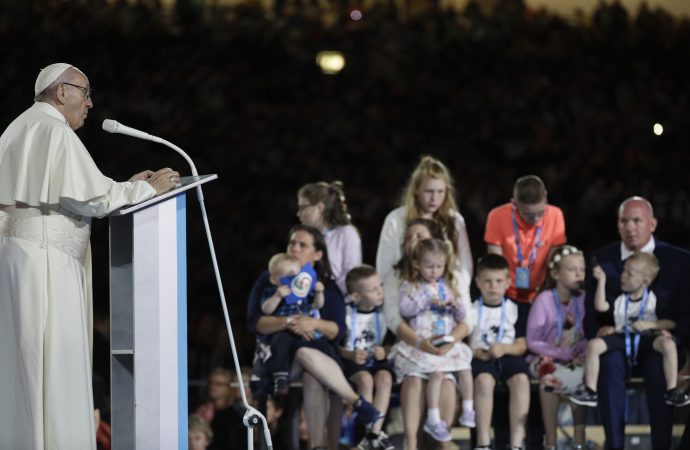In conversations about the protection of children in the Church or anywhere else, no consideration will ever be complete without the participation of those who have the most to say about any child’s life: the parents.
That reality makes it slightly ironic that as Pope Francis continues his high-stakes summit on abuse this week, parents seem to be the missing link.
Of 190 participants, only 10 of them are women, and only three of 12 speakers are women. Just two are mothers.
They’re the only two people taking part, in other words, for whom protecting children is not a matter of “spiritual parenthood” - not a theory, not a pious response to Jesus’ call for the apostles to “care for my sheep.”
Dads are nowhere to be seen, outside of the Vatican’s interim spokesman Alessandro Gissotti. On Monday, talking about the need to “look at the monster of abuse in the face,” he was visibly moved.
Asked why there aren’t more women in a gathering that’s supposed to serve as a turning point, organizers gave a slightly more articulate version of the Italian boh, meaning, “Who knows?”
The fact that parents, particularly mothers, are often described by Church officials as key players in sharing their faith with their children, only adds to the irony that they’re essentially invisible this week.
Let’s take the case of the Church in Ireland as an example.
When St. John Paul II visited Ireland 40 years ago, an estimated 90 percent of the country went to Sunday Mass. When Francis visited the Emerald Isle last year, estimates put that number at 30 percent.
What happened in between? Many things, including rampant secularism and economic transformation, but also the impact of the clerical sexual abuse crisis that began to erupt in 1984.
Since then, two generations of Irish people have led a hemorrhage of faithful from the pews, which reached an epitome in 2009 when people en masse joined a movement called “Count me Out,” headed primarily by women who were leaving the Church and taking their children with them.
They were tired of the hypocrisy of bishops talking about protecting children, but who, when push came to shove, protected the institution.
According to a recent announcement by the Irish bishops’ conference, the local church has no money to pay salaries to its priests and hasn’t done so since December. Traditionally, the bishops have relied on the contributions made by Mass-goers to cover the payroll. With fewer people in the pews, collections are down, and even some of those who still go have stopped giving.
It’s not just Ireland. In the United States, collection baskets now often feature notes announcing money will be withheld until children are safe.
It’s the trickle-down effect of the Church not walking the talk: Without mothers dragging their kids out of bed on Sundays for Mass, or patiently rocking a crying baby by the Church door trying to remain inconspicuous, there are no new generations of Catholics.
For any solution to have a trickle-up effect, the hierarchy will need to find a way to show parents that this time reform is for real. Parents will need to see serious, definitive steps being taken to guarantee that saying “never again” about these crimes and their subsequent cover-up is more than a slogan.
Francis and the organizers of this week’s summit have all indicated that this is simply one step on a long journey, and that follow-up will be key. To make that happen, the voices of parents arguably must be central.
At the end of the day, one can’t understand the impact of abuse until one sits down with a survivor. But equally, one can’t understand the urgency of keeping children safe until one has spoken with a parent who’s convinced her or his children aren’t.

